Are you a new member? Sign up now
Login area
| Sign up
Policy Support Observatory (PSO)

Background and Rationale
The Lebanese health sector has shown remarkable resilience and progress, despite an adverse geopolitical context. To a large extent this has been made possible by the performance of MoPH in its capacity of steward of the health sector
A review of achievements and the critical role of MoPH governance shows that the MoPH has gained considerable authority and respect in the sector: in terms of policy making, of sector regulation, and of brokerage between multiple stakeholders. It has developed an original and homegrown collaborative governance style, that mobilises two essential assets. First, strategic intelligence: a combination of scientific evidence, operational information, and an understanding of the geography of stakeholder interests. Second, social consensus: through systematic, open and transparent collaboration with stakeholder networks and sensitivity to the expectations of the public. MoPH’s governance track record has been, given circumstances, remarkable.
Nevertheless, the system remains vulnerable to Lebanon’s human and political geography, in a context of clientelism and politicisation. Furthermore, whereas MoPH has thus far managed to avoid direct confrontation with vested commercial interests, these remain present, with important stakes. Finally, the regional geopolitical context remains volatile: the health sector has thus far shown remarkable resilience, but likely future shocks need to be anticipated.
In this context MoPH’s collaborative governance must be consolidated and expanded, in two dimensions: a ‘technical’ one of institutionalising the reliance on evidence, information and alliance-building that has characterised MoPH work over the last two decades; and a ‘political’ one of building the social consensus and support for the collaborative efforts to rationalise the health sector.
Whilst MoPH capacities have grown considerably, not in the least through its collaboration with WHO and academia, current ad hoc arrangements need to morph into institutionalised capacity for producing strategic intelligence and preparation of collaborative decision and implementation processes, whilst bolstering the credibility and legitimacy of the MoPH leadership.
This can be done by equipping MoPH, in collaboration with WHO, with a Policy Support Observatory.
This can provide structured analytical and decision support capacity, in line with MoPH needs and taking full advantage of the various data sources that are being developed by MoPH and of its relations of collaboration with academia. Moreover, it can harness MoPH’s various collaborative networks which are instruments for implementation of shared policy objectives, and also, through the linkages with a wide range of constituencies, a powerful source of support and social consensus. Increased visibility of the technical work and achievements of the networks would not only enhance their stabilising influence, but also serve as a platform to market the innovations they represent for the Lebanese context (electronic medical record, continuity of care, person-centredness, active case-management,registration, capitation,…) and facilitate adoption of benchmark practices by contagion and diffusion
A review of achievements and the critical role of MoPH governance shows that the MoPH has gained considerable authority and respect in the sector: in terms of policy making, of sector regulation, and of brokerage between multiple stakeholders. It has developed an original and homegrown collaborative governance style, that mobilises two essential assets. First, strategic intelligence: a combination of scientific evidence, operational information, and an understanding of the geography of stakeholder interests. Second, social consensus: through systematic, open and transparent collaboration with stakeholder networks and sensitivity to the expectations of the public. MoPH’s governance track record has been, given circumstances, remarkable.
Nevertheless, the system remains vulnerable to Lebanon’s human and political geography, in a context of clientelism and politicisation. Furthermore, whereas MoPH has thus far managed to avoid direct confrontation with vested commercial interests, these remain present, with important stakes. Finally, the regional geopolitical context remains volatile: the health sector has thus far shown remarkable resilience, but likely future shocks need to be anticipated.
In this context MoPH’s collaborative governance must be consolidated and expanded, in two dimensions: a ‘technical’ one of institutionalising the reliance on evidence, information and alliance-building that has characterised MoPH work over the last two decades; and a ‘political’ one of building the social consensus and support for the collaborative efforts to rationalise the health sector.
Whilst MoPH capacities have grown considerably, not in the least through its collaboration with WHO and academia, current ad hoc arrangements need to morph into institutionalised capacity for producing strategic intelligence and preparation of collaborative decision and implementation processes, whilst bolstering the credibility and legitimacy of the MoPH leadership.
This can be done by equipping MoPH, in collaboration with WHO, with a Policy Support Observatory.
This can provide structured analytical and decision support capacity, in line with MoPH needs and taking full advantage of the various data sources that are being developed by MoPH and of its relations of collaboration with academia. Moreover, it can harness MoPH’s various collaborative networks which are instruments for implementation of shared policy objectives, and also, through the linkages with a wide range of constituencies, a powerful source of support and social consensus. Increased visibility of the technical work and achievements of the networks would not only enhance their stabilising influence, but also serve as a platform to market the innovations they represent for the Lebanese context (electronic medical record, continuity of care, person-centredness, active case-management,registration, capitation,…) and facilitate adoption of benchmark practices by contagion and diffusion

Mission
The PSO is a unit, located within MoPH, that is established in collaboration with WHO and the Faculty of Health Sciences (FHS) in the American University of Beirut (AUB). Its mission is to contribute to rational and sustainable policy formation and implementation by:
- Institutionalising the reliance of MOH and key health sector stakeholders on strategic intelligence that contextualises technical evidence with operational knowledge of the health sector and analysis of stakeholder and end-user expectations and interests;
- Promoting effective and resilient collaborative approaches to health sector governance; and
- Enhancing the social consensus around shared health sector policies.

Functions
The PSO has three functions:
- The PSO provides direct policy support inputs, to MOH and other health sector stakeholders, in terms of policy formation and translation into implementation. In doing so, the PSO:
- analyses the potential, limitations and implications of explicit, implicit and emergent policies and innovations in the health sector;
- provides technical assistance for upgrading the MOPH information system in order to generate pertinent information for decision making, policy implementation and evaluation;
- analyses and monitors the political geography of health sector stakeholders and people’s expectations regarding health care, with its implications for policy options;
- mobilises expertise, academic and other, in Lebanon and in other countries, so as to build an external knowledge network to guarantee that policy recommendations are based on the state of-the art scientific evidence.
- The PSO provides the permanent secretariat for the organisation of National Health Conference events involving a wide range of stakeholders in ongoing participative debates on key health sector issues. It assists the Organising Committee of the Conference to achieve, through the preparation, implementation and follow-up of these events, objectives of:
- Increased visibility of the technical work, achievements and innovations produced by health sector actors;
- Heightened awareness among stakeholders about competing priorities and emerging problems;
- Receptivity of public opinion to rational policies.
- The PSO moderates a Platform of Communities of Practice, for:
- Enhanced exchange of experience;
- Accelerated dissemination of organisational innovations and benchmark practices by contagion and diffusion;
- Enhanced consensus around, involvement in and ownership of health sector reform initiatives championed by MOH;
- Institutionalised and sustained reliance on collaborative governance;
- Identification of challenges, weaknesses and opportunities requiring further analysis or research.

Work Program
PSO Work Program document- English - October 2018
In the run-up to the establishment of the PSO, issues where policy action is required and possible have been pre-identified and configured as “PSO Projects”. Each “PSO Project” is a concrete and organized effort to take advantage of a perceived opportunity to deal with a circumscribed policy issue or challenge. Each PSO Project has a beginning and an end, is expected to produce direct deliverables and to contribute to improved capacity for health sector governance. PSO Projects are assigned to teams that include relevant MoPH staff and PSO. The configuration through which PSO runs a Project can vary as appropriate: PSO Core staff as such; PSO Core staff reinforced by external experts (contracted or rotated between academia and MoPH); or PSO managing a contract with an academic or civil society organisation that brings the necessary expertise and manpower.
In the selection of policy issues to be addressed through PSO Projects trade-offs had to be made:
In the selection of policy issues to be addressed through PSO Projects trade-offs had to be made:
- the policy issue that is addressed must be policy relevant and of strategic interest to the sector: it has to address a health sector issue or challenge where advances can be made that would contribute to improving health and health equity, moving towards universal coverage, and strengthen the institutional base for governing the health sector in the public interest.
- dealing with this issue in a Project format has to bring a potential for capacity building and creation of alliances with key sector stakeholders. This is key to ensure that the Project contributes to sustaining effective, collaborative, and information and evidence-based governance of the health sector.
- the policy issue has to be amenable to treatment in a project format and offer perspectives of translation into implementation within the country’s context and resources. This means building on Lebanon’s experience with incremental reform, where one moves forward where political and technical opportunities for doing so exist, and does not waste energy on issues where political or resource constraints make change an illusion.
There are consequences to these trade-offs. First, it means the selected Projects do not constitute a comprehensive reform plan (though most would no doubt be included in such a plan): this is because the selection of Projects had to balance the needs for change with the capacity and opportunities to move forward. Second, it means the list of PSO Projects that make up the Work Programme has to be seen as dynamic: it may change as new challenges and opportunities arise or avenues for change are closed. It behoves the PSO Guiding Committee, with its representation of MoPH, WHO and AUB to monitor the need to adapt the Work Programme over time.
The PSO Projects are grouped in four broad categories, according to the manner in which they are to support decision making and facilitate sector governance and organisation processes. These four broad categories are:
The PSO Projects are grouped in four broad categories, according to the manner in which they are to support decision making and facilitate sector governance and organisation processes. These four broad categories are:
I: Building MoPH & PSO readiness (2 PSO Projects);
II: Modernising health care provision for Universal Health Coverage with People-centred care (11 PSO Projects);
III: Generating strategic intelligence to guide sector governance (5 PSO Projects); and
IV: Organising the policy dialogue on the health sector and its future (5 PSO Projects).
II: Modernising health care provision for Universal Health Coverage with People-centred care (11 PSO Projects);
III: Generating strategic intelligence to guide sector governance (5 PSO Projects); and
IV: Organising the policy dialogue on the health sector and its future (5 PSO Projects).
(Review of the transformation of the Lebanese health care system conducted in preparation for the establishment of the PSO)

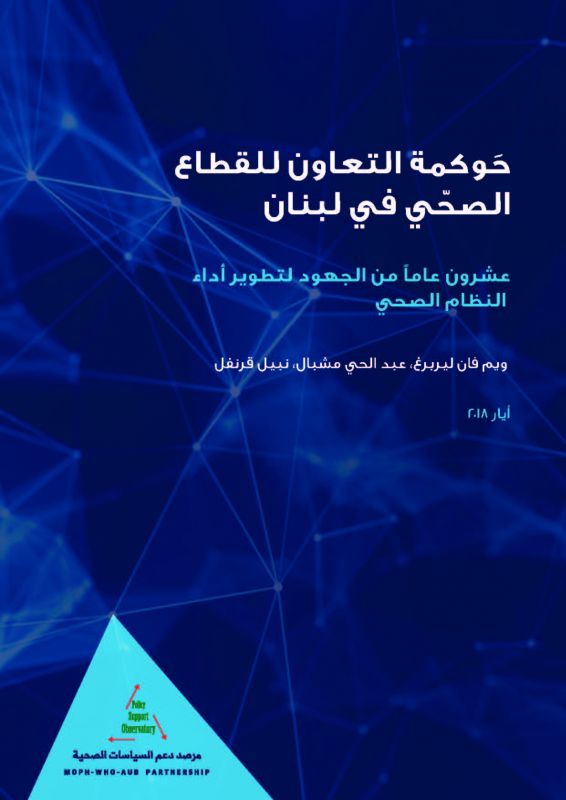 هذه الدراسة بعنوان «حوكمة التعاون للقطاع الصحي في لبنان » هي بمثابة مراجعة جيّدة التوثيق وسهلة القراءة للتحوّل الذي شهده نظام الرعاية الصحية في لبنان خلال العقدين الماضيين. أودّ أن أثني على جهود كل من الدكتور ويم فان ليربرغ والدكتور عبد الحي مشبال والدكتور نبيل قرنفل الذين انكبّوا على إعداد هذه الدراسة مستندين على الأدلّة العلمية والدراسات الاستقصائية الموثوقة التي تمّ نشرها والمقابلات المستفيضة ومسح مواقف كافة الأطراف الفاعلة...
هذه الدراسة بعنوان «حوكمة التعاون للقطاع الصحي في لبنان » هي بمثابة مراجعة جيّدة التوثيق وسهلة القراءة للتحوّل الذي شهده نظام الرعاية الصحية في لبنان خلال العقدين الماضيين. أودّ أن أثني على جهود كل من الدكتور ويم فان ليربرغ والدكتور عبد الحي مشبال والدكتور نبيل قرنفل الذين انكبّوا على إعداد هذه الدراسة مستندين على الأدلّة العلمية والدراسات الاستقصائية الموثوقة التي تمّ نشرها والمقابلات المستفيضة ومسح مواقف كافة الأطراف الفاعلة...

This essay on “The collaborative governance of Lebanon’s health sector” is a well-documented, easily read, review of the transformation of Lebanon’s health care system, over the past two decades. I would like to commend Dr. Wim Vanlerbergh, Dr. Abdel Hay Mechbal and Dr. Nabil Kronfol, who put this together based on evidence, published robust surveys, extensive interviews and mapping of all stakeholders’ positions...
 هذه الدراسة بعنوان «حوكمة التعاون للقطاع الصحي في لبنان » هي بمثابة مراجعة جيّدة التوثيق وسهلة القراءة للتحوّل الذي شهده نظام الرعاية الصحية في لبنان خلال العقدين الماضيين. أودّ أن أثني على جهود كل من الدكتور ويم فان ليربرغ والدكتور عبد الحي مشبال والدكتور نبيل قرنفل الذين انكبّوا على إعداد هذه الدراسة مستندين على الأدلّة العلمية والدراسات الاستقصائية الموثوقة التي تمّ نشرها والمقابلات المستفيضة ومسح مواقف كافة الأطراف الفاعلة...
هذه الدراسة بعنوان «حوكمة التعاون للقطاع الصحي في لبنان » هي بمثابة مراجعة جيّدة التوثيق وسهلة القراءة للتحوّل الذي شهده نظام الرعاية الصحية في لبنان خلال العقدين الماضيين. أودّ أن أثني على جهود كل من الدكتور ويم فان ليربرغ والدكتور عبد الحي مشبال والدكتور نبيل قرنفل الذين انكبّوا على إعداد هذه الدراسة مستندين على الأدلّة العلمية والدراسات الاستقصائية الموثوقة التي تمّ نشرها والمقابلات المستفيضة ومسح مواقف كافة الأطراف الفاعلة...Launching Event 16-4-2018
Launching of the PSO at the MoPH in Partnership with the WHO and AUB
PSO In "Health FOR All" 1Issue 83, 1 January – 30 june 2018 published by the WHO- Lebanon Office
Words Spoken:
Minister of Public Health, Mr. Ghassan Hasbani
Director General of the MoPH, Dr. Walid Ammar
Director General of the WHO, Dr. Tedros Adhanom Ghebreyesus
(video for Dr. Tedros speech)
Acting Director of the WHO-EMRO, Dr. Jawad EL Mahjour
President of the AUB, Dr. Fadlo Khuri
PSO Going in Newspapers 17-4-2018:
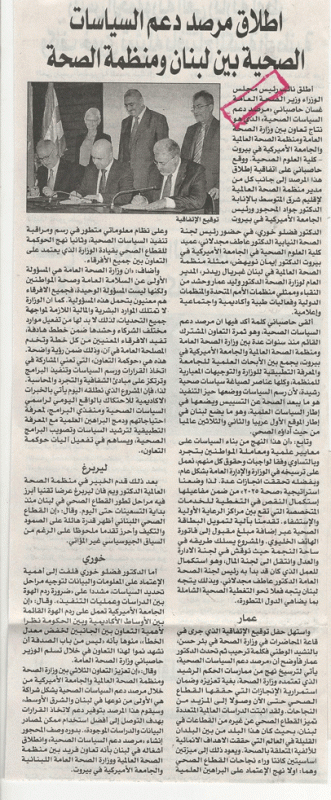
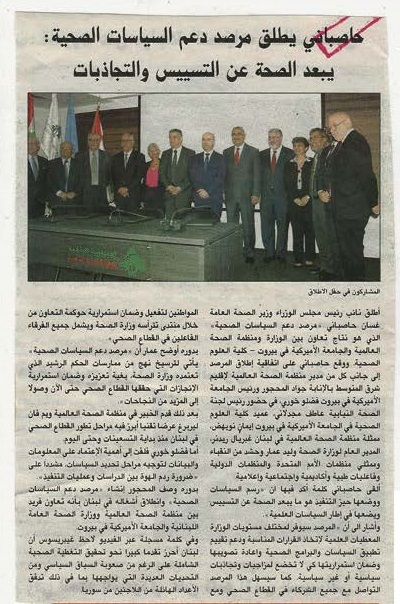
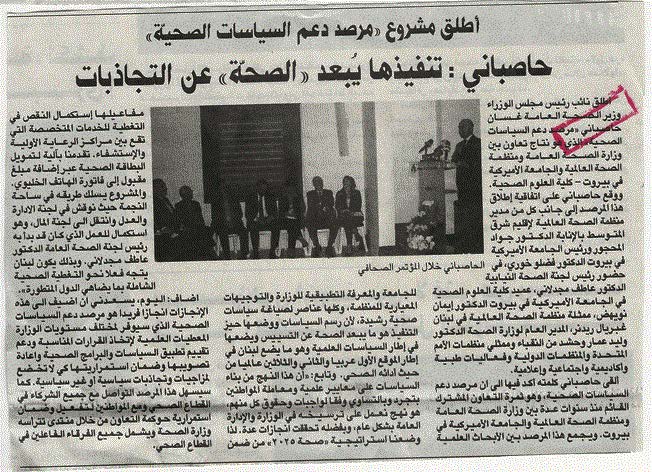
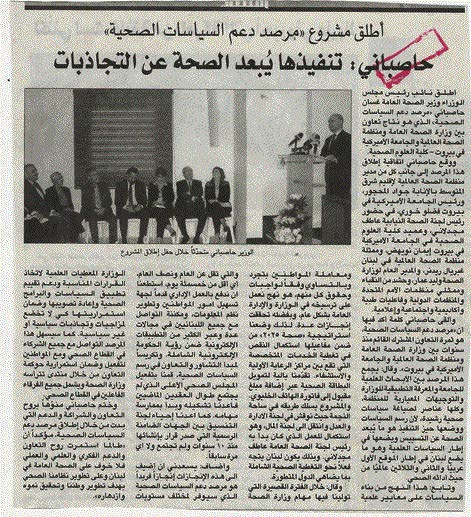
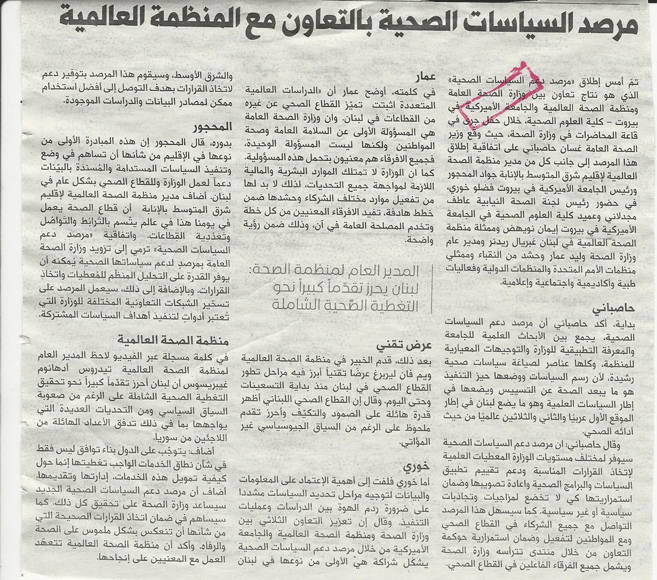
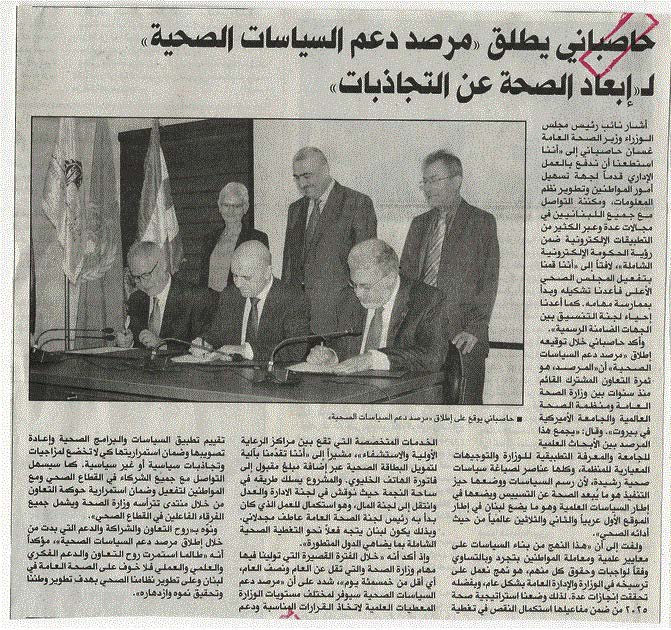
Anwar Charek Diyar Liwaa Joumhouriya Moustakbal
Launching of the PSO at the MoPH in Partnership with the WHO and AUB
PSO In "Health FOR All" 1Issue 83, 1 January – 30 june 2018 published by the WHO- Lebanon Office
Words Spoken:
Minister of Public Health, Mr. Ghassan Hasbani
Director General of the MoPH, Dr. Walid Ammar
Director General of the WHO, Dr. Tedros Adhanom Ghebreyesus
(video for Dr. Tedros speech)
Acting Director of the WHO-EMRO, Dr. Jawad EL Mahjour
President of the AUB, Dr. Fadlo Khuri
PSO Going in Newspapers 17-4-2018:






Anwar Charek Diyar Liwaa Joumhouriya Moustakbal
Decision No. 887/1
Minister Decision No. 887/1 Date 11/5/2018 related to establishing the PSO
Second Guiding Committee Meeting 4-10-2018 :
The PSO Holds its Second Guiding Committee Meeting to Discuss the Work-Program
First Guiding Committee Meeting 19-6-2018:
Hasbani Presided over the First Meeting of the PSO Guiding Committee to Discuss Priority Areas for the PSO Work Plan
PSO Going in Newspapers 20-6-2018
Minister Decision No. 887/1 Date 11/5/2018 related to establishing the PSO
Second Guiding Committee Meeting 4-10-2018 :
The PSO Holds its Second Guiding Committee Meeting to Discuss the Work-Program
First Guiding Committee Meeting 19-6-2018:
Hasbani Presided over the First Meeting of the PSO Guiding Committee to Discuss Priority Areas for the PSO Work Plan
PSO Going in Newspapers 20-6-2018
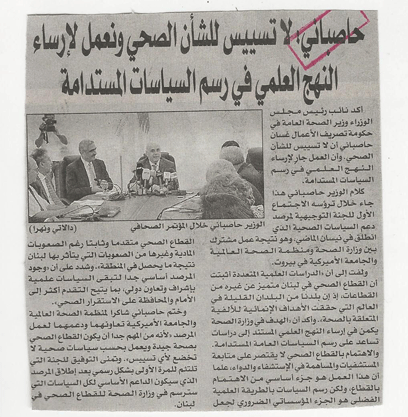
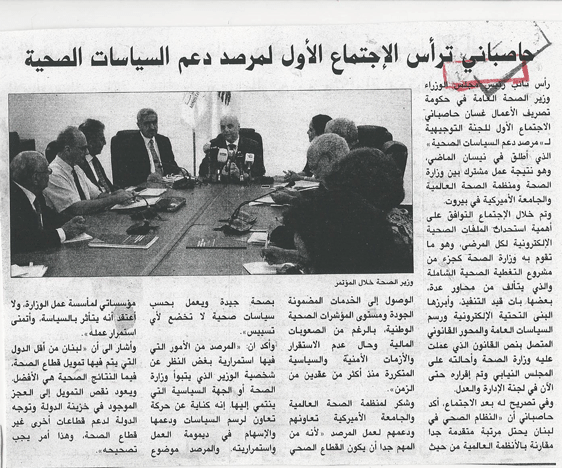
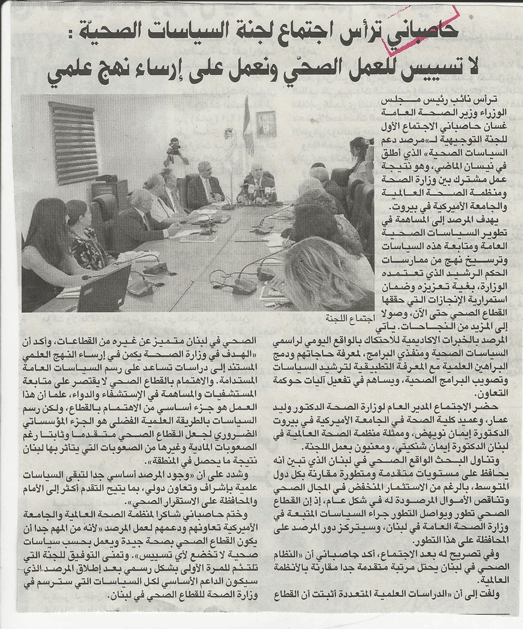
.gif)
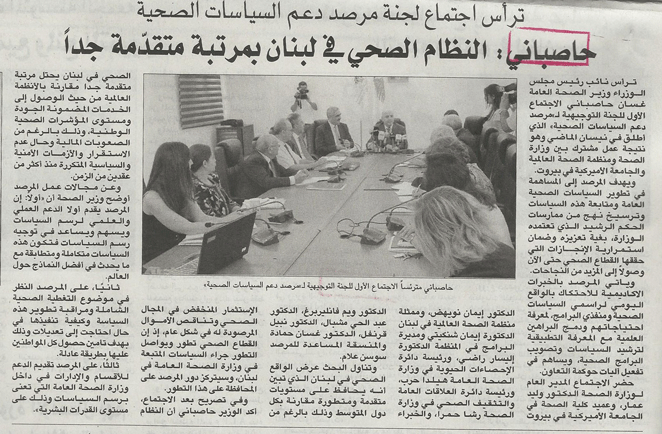
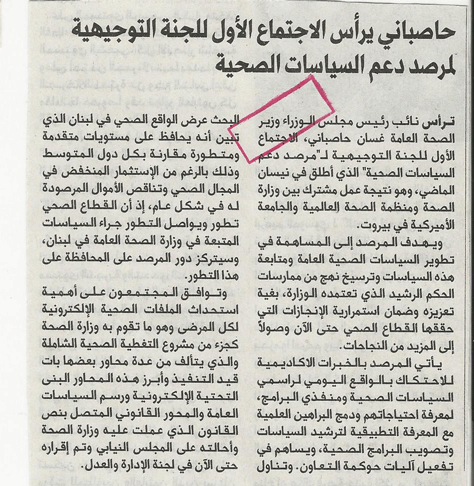
Anwar Charek Diyar Joumhouriya Liwaa Nahar
I: Building MoPH & PSO readiness (2 PSO Projects)
II: Modernising health care provision for Universal Health Coverage with People-centred care (11 PSO Projects)
- Project 4- EHR: Generalising the use of State-of-the-Art Electronic Health Records
- Project Description (pdf link (Building Consensus on the readiness for EHR in Lebanon or E-Health Roadmap (pdf link)
- General Meeting -June 15, 2019. (photos)
-web.jpg)
-web.jpg)
III: Generating strategic intelligence to guide sector governance (5 PSO Projects)
IV: Organising the policy dialogue on the health sector and its future (5 PSO Projects)
Sitemap 

© Copyrights reserved to Ministry of Public Health 2026


















